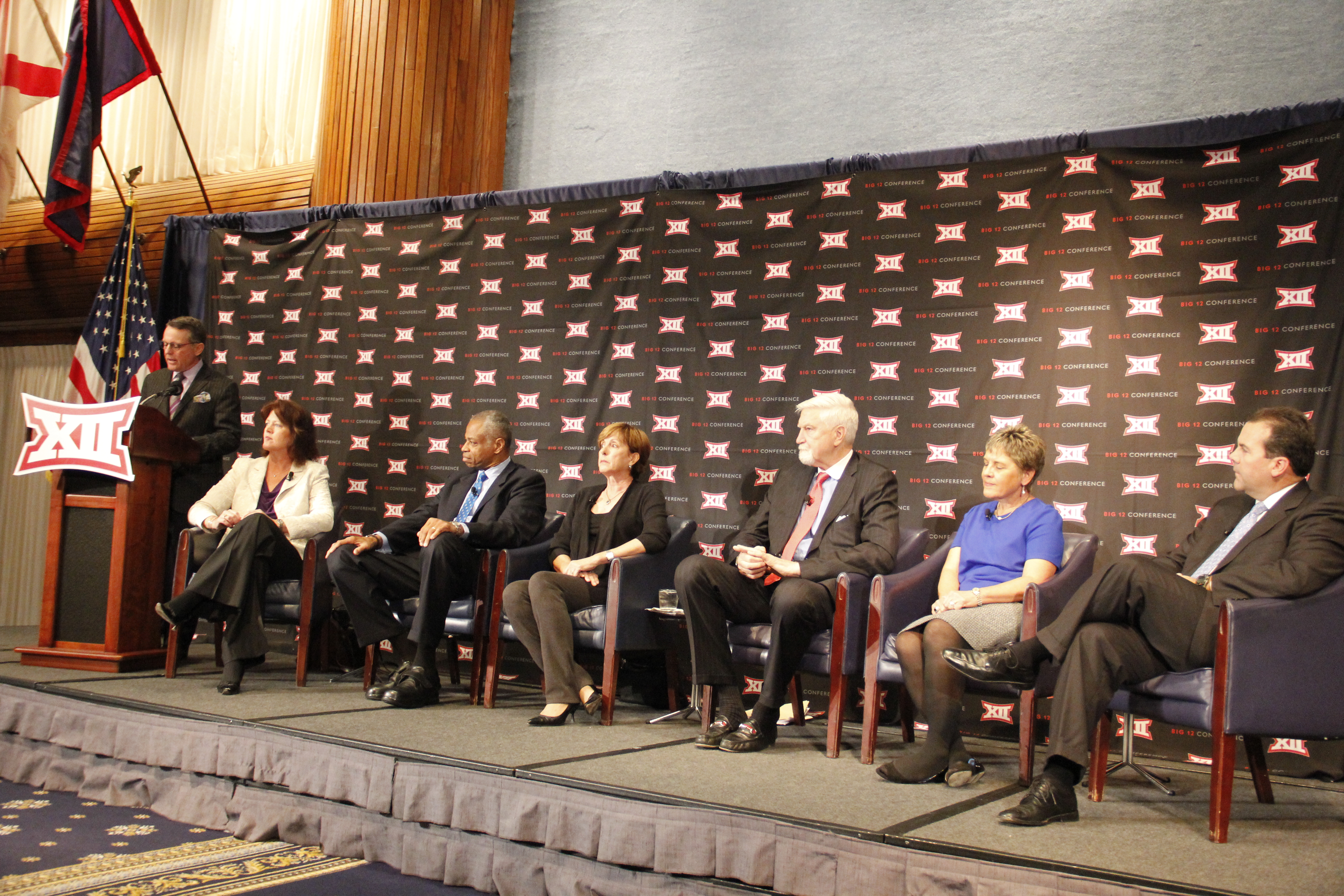WASHINGTON- Lawsuits, million-dollar coaching salaries, and questionable oversight continue to drag down the NCAA’s reputation. College sports will face a day of reckoning, experts say, but first the games need a tough new supervisor— a “benevolent dictator,” maybe.
“I’m all for big time college sports but the money needs to be handled differently,” said Tom McMillen, retired NBA player and former U.S. congressman.
He was one the only panelist Tuesday at the Forum on State of College Athletics who said that college athletes should be paid. “It’s just a matter of time before this system blows up,” McMillen said.
McMillen and five other panelists at the event hosted by the Big 12 Conference agreed that college athletics needs fixing. The crux of the conversation was the National Labor Relations Board decision that student-athletes are employees, and have the ability to unionize. The decision, which is under appeal, threatens the amateur status of college athletes and fuels the ongoing question of whether or not to pay them.
Christine Brennan, USA Today sports columnist, criticized media coverage of the issue. She said that many of her male colleagues continue to beat the drum for paying athletes, but only for the two big revenue sports, football and men’s basketball.
Others echoed Brennan’s point.
“We seem to be focused on the one percent of the student athletes who bring an awful lot of talent to the table then matriculates to the NBA or the NFL” said Sheahon Zenger, athletic director at the University of Kansas. “We sort of are ignoring the 99 percent of the others.”
The overwhelming majority that don’t make it to a professional league include athletes like tennis players, swimmers, and women’s lacrosse players; those who don’t always get tailgate parties or TV time. Chris Plonsky, athletic director of the University of Texas at Austin, said that paying every student athlete would create an unsustainable environment.
“You’re not going to pay Tom and not be able to pay Mary, if you think you are, you’re naïve,” Plonsky said. “There’s no Mary out there that’s going to tolerate that.”
There are nearly 200,000 women, competing in college sports, according to the NCAA.
Plonsky, like NCAA president Mark Emmert, argued that the value of a college scholarship is adequate compensation. She also said that dollars from Texas’s ESPN television deal are funneled directly back into the school and pay for the salaries top-of-the-line sports medicine employees.
Plonsky and others continue to resist the student-as-employee definition.
“It’s a volunteer type of situation, no one is twisting your warm to embark upon on what today Division 1 NCAA athletics requires. It’s not easy, and it’s not for everybody. If it was, everybody would be doing it,” Plonsky said.
McMillen, a star basketball player at the University of Maryland, wouldn’t budge and argued that paying athletes is only fair.
“I think it’s a way to bring them a piece of the pie,” McMillen said. The NCAA pie, brings in more than $870 million annually, according to the organization’s website.
But there’s plenty to argue about in college athletics beyond salaries. High-profile court battles, such as O’Bannon v. NCAA over use of athletes’ likeness, continue to push the NCAA into the public eye.
“What has happened in college sports is that nobody is in charge. Ultimately there has to be congressional involvement,” said McMillen, who served as a Maryland congressmen from 1987 to 1993.
NCAA President Emmert’s organization doesn’t have control over conferences and can’t always regulate what happens within athletic departments. The NCAA is made up of about 1,200 universities, and some of them fall short in the supervising their athletes’ behavior away from the playing fields.
Plonsky said that the University of Texas would welcome congressional review to take the focus away from negative issues such as generous coaching salaries. Texas football coach Charlie Strong will make $5 million for the next five years and the school must also spend $4.75 million for a buyout from his contract at the University of Louisville, according to USA Today.
Plonksky said that an oversight committee could help uncover the good things athletic departments are doing. “So if that happens with a government type agency, that’s where we need to start,” she said.
Len Elmore, McMillen’s former University of Maryland teammate, also a former NBA player and an ESPN announcer, went so far as to compare college athletics to the Wild West. “You had to hire a strong watchdog to be able to clean it up,” Elmore said. “Something strong like that has to be done and I think that a congressional oversight review is a first step towards that.”
Legislation will be introduced during the lame duck Congress session in November to establish a presidential commission to study college athletics, according to McMillen. He said the bill is meant to ask the big question: “what is in our best interest as a country?”


